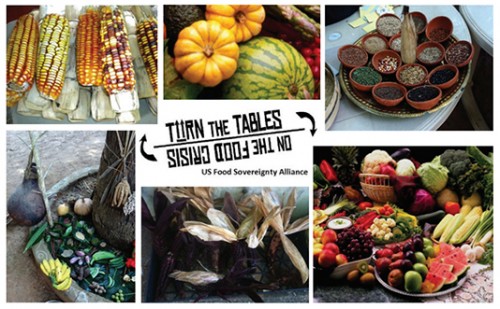Seeds are a patrimony of humankind and part of the collective wealth known as the commons. For thousands of years, women and men have selected and multiplied seeds to feed their families. Along with land and water, seeds are a basic asset to produce food. Without access to and control of seeds, food producers would go hungry.
 Yet farmers are increasingly losing their right to seeds. Multinational corporations are allowed to buy seed companies to create local monopolies, control nations’ germplasm banks (facilities that store the genetic material of plants) and patent seeds, requiring farmers to enter into contracts that do not allow them to save seeds or use seeds from other sources. A new publication from the U.S. Food Sovereignty Alliance, “A Preliminary Report on Seeds & Seed Practices across the United States,”written with input from WhyHunger’s Saulo Araujo, is a step in the right direction toward increasing awareness of seed sovereignty and the resource rights of farmers.
Yet farmers are increasingly losing their right to seeds. Multinational corporations are allowed to buy seed companies to create local monopolies, control nations’ germplasm banks (facilities that store the genetic material of plants) and patent seeds, requiring farmers to enter into contracts that do not allow them to save seeds or use seeds from other sources. A new publication from the U.S. Food Sovereignty Alliance, “A Preliminary Report on Seeds & Seed Practices across the United States,”written with input from WhyHunger’s Saulo Araujo, is a step in the right direction toward increasing awareness of seed sovereignty and the resource rights of farmers.
The report is a compilation of data and anecdotes from a survey on U.S. seed practices taken by 70 growers from diverse geographical areas and backgrounds, and is meant to provide readers with an overview of the activities for building food and seed sovereignty. Seed sovereignty is the right of every person to save, plant and exchange seeds. By reading personal stories and studying graphs of responses, learn about human connections with heritage seeds, how growers determine which seeds to save and plant, and why saving seeds matters in the changing landscape of the food system.
The report is dedicated to the memory of Charity Hicks, who passed away last summer due to injuries incurred from a hit-and-run driver in New York City. Charity worked to develop concepts and wrote parts of the report.
See the full publication at A Preliminary Report on Seeds & Seed Practices across the United States.




